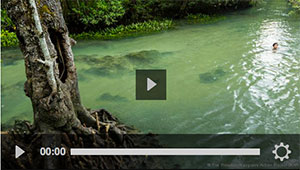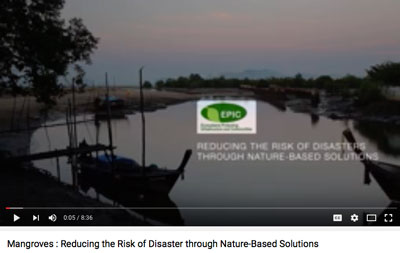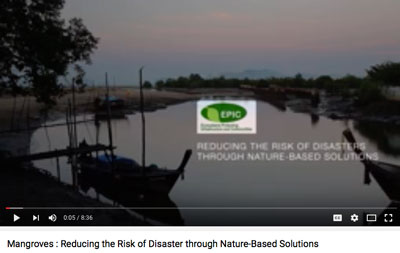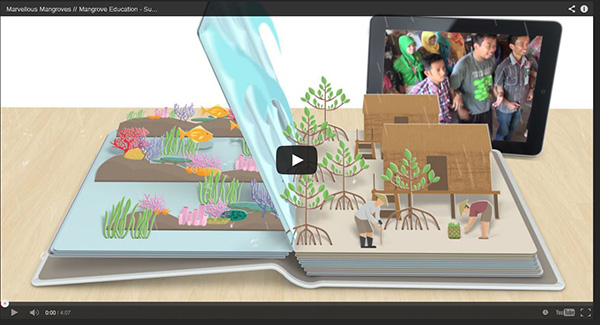FEATURE STORY New life in old shrimp ponds

THAILAND – Mangroves were cleared in many places in Thailand to make way for shrimp ponds. But these days, many of these ponds lie idle. An initiative is trying to bring back the mangroves – which would benefit locals as well.Thick mangrove forests once grew on Thailand's Kho Klang island – but they were cleared, among other things to make way for shrimp farming ponds. The move had devastating consequences for biodiversity, but as shrimp farming is no longer profitable on the island, many ponds now lie idle. In her efforts to bring back the mangroves, environmental activist Jaruwan Enright has found a new ally: the island's imam and owner of some of the ponds. VIEW VIDEO ASIA Sprouting a hopeful future

THAILAND – Ms. Jaruwan Enright, the Mangrove Action Project’s Field Project Manager, was recently featured in a Deutsche Welle (DW) film for their Global Idea Series entitled “New life in old shrimp ponds.” Filming by Bastian Hartig took place in early June over 4 days on Klang Island in the Krabi River estuary where MAP’s Ecosystem Protecting Infrastructure and Communities (EPIC) project is based. The video is DW’s follow up to their article “Bringing devastated mangroves back to life” Jaruwan is heading the field implementation of MAP’s EPIC project which is demonstrating the use of Community Based Ecological Mangrove Restoration (CBEMR) to restore abandoned shrimp ponds back to biodiverse mangrove which will provide a green bio-shield to the vulnerable island communities in times of tropical storms or even a tsunami. If large numbers of island ponds are rehabilitated back to mangrove forest then Ecological Disaster Risk Reduction (Eco-DRR) will be achieved. This is a nature-based solution to climate change, which is causing sea-level rise and more intense and frequent tropical storm during the monsoon season. READ MORE Bangladesh coal plant threatens World Heritage mangrove: petition
BANGLADESH – The world's largest mangrove forest, a World Heritage Site, should be listed as endangered due to a coal-fired power plant under construction in Bangladesh, urged a petition signed by 50,000 people and submitted to the UN recently. Classified by the UN's culture and science organ, UNESCO, in 1997 as a natural treasure, the Sunderbans which straddles the border of India and Bangladesh, provides a defence against storm surges and cyclones to some four million people in the region. At the same time, its 10,000 sq km (3,800 sq miles) expanse is home to some of the planet's most iconic threatened species, including a population of about 100 tigers and the Ganges river dolphin. The planned 1,320 Megawatt Rampal plant, a joint project by India and Bangladesh, would be powered each year by nearly five million tons of coal transported by boat along the ecosystem's fragile waterways, boosting the risk of oil and coal spills. READ MORE Mangrove Loss in Indonesia 2000 – 2012 Results Alarming
INDONESIA – Between 2000 and 2012, Indonesia lost 3.11% of its mangrove forest area (Hamilton and Casey 2014). This is substantially higher than the 1.97% global average. This is problematic as Indonesia contains approximately 28% of the world’s mangrove forest. To put this in perspective, Indonesia’s 21st Century mangrove loss is more mangrove forest than actually exists in all but 20 of the top 100 mangrove-holding nations. Mangrove loss in Indonesia is responsible for just under half of all global mangrove deforestation that has occurred in the 21st Century. Earlier research indicates aquaculture, agriculture, and urbanization as reasons for mangrove losses in Indonesia pre-2000, but post-2000 the reasons for the continued mangrove loss remained opaque until this study. READ MORE Editor’s Note : China's shrimp farm industry has all the earmarks of the shrimp farm industry that we saw in the 1980s and 1990s and the 1st decades of this millennia-disease, water pollution, salinization of land and waters, overcrowding stock, market vagaries, overuse and misuse of antibiotics and chemicals, land ruination and natural resource loss, ill-effects on local communities. They too seem to follow the same old and tried recipe book for disaster, which I personally wish I would have long ago written and published, as I'd have made a great fortune on the huge demand for such a book due to continued ignorance and blind faith of this industry in its “traditional” open, throughput system approach to shrimp farming. Whether it's in Asia, Latin America or Africa, this industry grows failure and instability, while its too eager practitioners overall lack wisdom and insight, and are simply expanding the darkness of the cave they work in!
China’s shrimp industry still leads, but problems loom
CHINA – An announcement from the East China Sea Fisheries Research Institute this month regarding a supposedly innovative shrimp seedling is the latest example of the search in China for a game-changer to boost its flagging national shrimp industry. The institute claims its ‘Huang Hai No.2’ shrimp seedling, which is currently in trials in shrimp ponds in Hebei Province in northern China, will increase the average body weight of vannamei shrimp by 30 percent. The promising new seedling could answer some significant problems in China’s shrimp farming sector, as vannamei shrimp has become the overwhelming leader in the Chinese shrimp market since it was introduced to China in the 1990s, displacing other varieties, including what locals term the ‘Japan shrimp.’ While China remains the top producer of farmed shrimp in Asia, growing almost 1.8 million tons in 2015, up from 1.01 million tons in 2014 and 910,000 tons in 2013, there are signs its dominance in the marketplace will not continue. READ MORE Overcrowding destroying Phi Phi's Maya Bay

THAILAND – Although it is now the low season, world-renowned Maya Bay in Phi Phi Marine National Park is overcrowded with tourists and boats, posing a serious threat to the environment, particularly coral, marine biologist Thon Thamrongnawasawat has warned. Mr Thon, deputy dean of the fisheries faculty at Kasetsart University, said he was shocked during a recent visit to see the entire bay was jammed with both long-tailed and speed boat ferries as tourists from inside and outside the country, particularly China and Europe, crammed on to famous Ko Phi Phi Leh island. The beach was densely crowded with tourists, with only standing space left, he said. Mr Thon, who was on a visit to gather information on coral bleaching and the effects of tourism, said he was aghast at what he saw at the country's most famous marine park, even though it is now the low season for tourists. READ MORE AFRICA Africa’s Charcoal Economy Is Cooking. The Trees Are Paying

MADAGASCAR – In Madagascar, an island nation off the eastern African coast and one of the world’s richest nations in biodiversity, the booming charcoal business is contributing to deforestation. It is expected to exacerbate the effects of climate change, which has already disrupted farming, fueled a migration to cities, and pushed many rural residents into the one thriving business left: charcoal. Sellers now appear on street corners throughout Toliara, hawking charcoal made from trees from the surrounding forests, an ecologically rich and fragile area with plants and animals found nowhere else. Throughout the day, their supplies are replenished by pickup trucks and convoys of ox-drawn carts. But acquiring high-quality charcoal made from hardwood trees has become increasingly difficult for dealers like Mr. Andrianiana, 44, as a third straight year of drought has pushed ever more people into the charcoal trade. He now wakes up at 3 a.m. and rides his bicycle an hour north to try to strike deals with charcoal producers before his competitors do. READ MORE EUROPE 185 Environmental Activists Across 16 Countries Were Killed in 2015

U.K. – Scores of people around the world were murdered last year while trying to protect their communities from illegal mining and logging, palm oil agriculture and other industrial development projects, according to a London-based environmental and human rights organization. The number of confirmed killings—185 activists across 16 countries—increased by 59 percent from 2014, according to Global Witness. It was the highest death toll in one year since the group began tracking such killings in 2002, said campaign leader Billy Kyte, who wrote the group's new report on the persecution and murders of environmental and land rights activists in 2015. READ MORE Activists from Indonesia, Liberia, Colombia and Peru to EU tells of palm horror
U.K. – A delegation of indigenous people from Indonesia, Liberia, Colombia and Peru did a tour of European capitals last month to give policymakers and investors first-hand testimony of what they said were escalating human rights and environmental abuses linked to the rapid spread of palm oil cultivation. The delegation, which visited the Netherlands, Germany, Brussels and London during the 10-day tour, said that members of the Roundtable on Sustainable Palm Oil (RSPO) frequently flout the voluntary group’s requirement to respect community land rights, and are involved in human rights abuses and destructive plantation development. At a press conference in London, Tom Griffiths of UK NGO Forest Peoples Programme, which sponsored the tour, said while the RSPO is beginning to crack down on malpractice by its members, it has a long way to go before all RSPO members’ palm oil is conflict-free. “The key message of the mission is that these [palm oil] operations should be suspended until land rights are secured and proper protections are in place,” he said. READ MORE LAST WORD(S) Be sure to watch our recent video now available on Youtube. We encourage you to share on facebook and twitter to help get this important message out!  BACK TO TOP
Not yet a subscriber? Click here to subscribe. Please cut and paste these news alerts/ action alerts on to your own lists and contacts. Help us spread the word and further generate letters of concern, as this can make a big difference in helping to halt a wrongdoing or encourage correct action. ACTION ALERTS WANTED: MAP News is looking for links to calls to actions/petitions and letter writing campaigns on mangrove issues, tropical coastal communities and other related topics. Not all submissions can be selected, but we look forward to hearing about your work and want to let our readers' voice be heard!
Email submissions to news@mangroveactionproject.org | Action Alerts:MANGROVE ACTION DAY IS JULY 21
It is time to look back on some of our biggest accomplishments, and energize our new community for what the next 24 years will hold! I'd like to personally invite you to join me for Mangrove Action Day Thursday July 21st to celebrate 24 years of hard work. RSVP HERE Tell the Ex-Im Bank: Don't let Big Coal wreck mangrove forests
The U.S. Export-Import Bank is considering using US tax dollars to pay for two coal plants in Bangladesh. These projects would wreck the world’s largest mangrove forest and devastate the Bengal tigers that live there. We need your help to stop it! The world's largest mangrove forest is in danger from a massive coal plant.
UNESCO can put pressure on India and Bangladesh to protect the forest, but they need to see that people around the world are speaking out. Click here to add your voice. Stop Navy Warfare training over our National Parks – Olympic National Park, a World Heritage site is threatened by US training in Electromagnetic Warfare. Tell them to stop. Sign our petition Our new short documentary, Reducing the Risk of Disaster through Nature-Based Solutions : Mangroves 
The Salt River Bay National Historical Park and Ecological Preserve’s Bioluminescent Bay is under NEW attack by our local National Park Service. WE NEED TO PROTECT THE PARK FROM THOSE WHO PRETEND TO PROTECT IT. CALL FOR CHILDRENS ART: We invite all primary school children from tropical and sub-tropical nations, and whose schools are located near mangroves, to create art telling us "why mangroves are important to my community and me?” Selected winners will be published in the 2017 calendar to be distributed internationally READ MORE 
Tell Dam Builders to Pull Out of Agua Zarca Dam! For years, critics of the Agua Zarca dam project in Honduras have been targeted by a campaign of violence, intimidation and outright murder. Then, on March 2, Berta Cáceres – vocal critic of the Agua Zarca Dam, Goldman Prize winner and mother of four – was brutally murdered in her home. ENOUGH IS ENOUGH Sign out Petition Tell Red Lobster its "Endless shrimp" deal is damaging and unfair to the workers SIGN THE PETITION
Mangroves: Guidebook to Malaysia – available for download here
Mangrove rehabilitation in Asia – Local Action and cross-border Transfer of Knowledge for the Conservation of Climate, Forests and Biodiversity VIEW VIDEOS HERE Volunteer Opportunities with Mangrove Action Project CLICK HERE
STOP PLANTING MANGROVES ON SEAGRASS BEDS _ A CALL TO ACTION What is CBEMR? Easy to follow fact sheet – CLICK HERE SHARE MAP'S VISION
CLICK HERE to watch short introductory video. Together we can work "at the roots of the sea". Join us in saving our beautiful country!
We hope you have been following the ongoing battle in Bimini, Bahamas.
We are in need of your help more than ever Click here
Exclusive Interview with Alfredo Quarto, Co-Founder and Executive Director of Mangrove Action Project – See more
Marvellous Mangroves Curriculum Marvellous Mangroves Curriculum in Bangladesh – WATCH VIDEO MARVELLOUS MANGROVES IN BRAZIL
En Portuges Check out our presentation for more details on Marvellous Mangroves “Education In The Mangroves" can now be seen on the PhotoPhilanthropy website here! Read this 10 page history of the development of MAP’s educational curriculum VIEW DOCUMENT
Article in Canada's Green Teacher Magazine – Read More
FREE MAP Mangrove e-cards CLICK HERE
 MAP’s e-Cards offer you a unique way to spread the word about MAP’s good works, while sharing beautiful photographs of the mangroves
Donate to MAP via Paypal
Giving could never be easier
It’s the action, not the fruit of the action, that's important. You have to do the right thing. It may not be in your power, may not be in your time, that there'll be any fruit. But that doesn't mean you stop doing the right thing. You may never know what results come from your action. But if you do nothing, there will be no result. —Mahatma Gandhi
Green Planet Fundraising Assists MAP – LEARN MORE
MANGROVE ISSUES The importance of restoring mangroves in an effective, long-term manner. Mangrove CBEMR video – VIEW Question Your Shrimp Consumer/Markets Campaign! WATCH VIDEO Mangrove Restoration in Asia – Watch Short Video 
READ A MOSAIC OF LIFE Peek into the underwater world of mangroves, "womb of the sea." By Liz Cunningham Photos By Wes Matweyew and Liz Cunningham
"Question Your Shrimp" Campaign Learn more about the affects of the shrimp industry on mangroves by visiting our blog Editor’s Note: Mangrove Action Project’s Executive Director, Alfredo Quarto was interviewed about shrimp by Green Acre Radio’s Martha Baskin Information sheds clear light on shrimp-mangrove connection

Not yet a MAP News subscriber?
Click here to subscribe.
Note to Our Readers:
We strive to keep active links in our newsletter. However, due to circumstances beyond our control, occasionally links to stories may become broken. If you find a link to a story is not functioning, please cut and paste the headline into your browser search bar. In most cases you should be able to locate the original story.
Help Mangrove Action Project through your recycled E-Waste. List of Accepted E-waste Items:Injet Cartidges, Cell Phones, Pagers, GPS, Radar Detectors, Mobile Hot Spots, Calculators, eBook Readers, iPods/MP3 players, Digital/Video Cameras/Camcorders, PDAs, iPads/Tablets/Laptops, Video Game Consoles, Handheld Video GamesVisit the Mangrove Action Project recycle website Click on the recycle button then click on the Download Shipping Label, and follow the instructions. 
|















